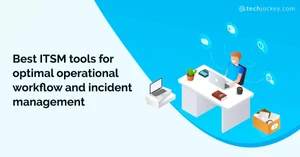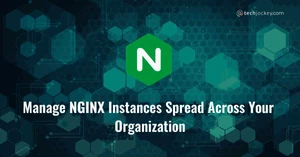What is a Hyperconverged Infrastructure Solution?
HCI Hyper converged infrastructure is a modern approach to managing data centers. It brings together everything one needs for a data center - storage, computing, networking, and management - into one unified system. Imagine taking servers and storage, putting them together, and adding smart software to create a flexible infrastructure. This replaces the old way of doing things with separate servers, storage networks, and storage devices. In HCI, regular data center servers are attached with storage devices like spinning disks or flash drives, all connected through smart software. This setup gets rid of the usual problems that come with traditional-style infrastructure, making data center management much smoother and more efficient.
How Does Hyperconverged Infrastructure Software Work?
HyperConverged infrastructure solutions are a big deal in data center management. Here is how HCI works with a better understanding of its key components and functionalities;
- Convergence of Datacenter Stack: HCI Hyper converged infrastructure is a transformative approach that integrates every critical element of a data center into a single, cohesive system. It merges compute, storage, storage networking, and virtualization, simplifying complex data center management.
- The Hardware Foundation: At the core of HCI are commodity data center server hardware and locally attached storage devices, which can be either traditional spinning disks or high-speed flash storage. Each of these servers, also known as nodes, contains x86 processors, SSDs, and HDDs. This hardware configuration is highly flexible and allows for precise workload sizing and scalable expansion as business needs evolve.
- Optimized for Performance: Hyperconverged solutions are designed to excel in performance and resilience. The software running on each node distributes all operational tasks across the cluster, ensuring superior performance and reliability. Flash storage is included in all nodes to optimize storage performance, and all-flash nodes are available for applications that require maximum I/O throughput with minimal latency.
- Resource Scaling: Hyperconverged storage offers the ability to independently scale various resources such as CPU, RAM, and storage. Additionally, GPU options are available for graphics acceleration, making it suitable for a wide range of workloads.
- Streamlined Management: One of the key advantages of hyper converged data center is its integrated management pane. This unified interface streamlines administrative responsibilities by obviating the necessity for distinct management resolutions pertaining to servers, storage, storage networks, and virtualization.
Who Uses Hyperconverged Infrastructure Solutions?
Hyperconverged infrastructure solutions are transforming the way organizations manage their data centers, but who are the users benefiting from this innovative technology? Here are the diverse range of users and industries that rely on hyperconverged system;
- Modern Enterprises of All Sizes: Hyperconverged infrastructure solutions are not limited by the scale of the organization. These solutions serve a wide range of businesses, from small startups to big enterprises. The flexibility and scalability of HCI make it a viable choice for businesses of any size looking to streamline their data center operations.
- Data-Driven Industries: Industries heavily reliant on data, such as finance, healthcare, and e-commerce, find HCI particularly advantageous. Efficiently handling and processing large volumes of data is vital in these industries, and that's why HCI is the perfect choice for their infrastructure requirements.
- IT Departments Seeking Simplification: IT departments across various industries are adopting HCI to simplify their operations. It reduces complexity by converging multiple data center components into a unified system.
- Growing Businesses: Hyperconverged infrastructure solutions are designed to accommodate growth. As businesses grow, they can effortlessly expand their HCI environment to meet increased demands.
- Virtualization Enthusiasts: Hyperconverged system complements virtualization initiatives. Businesses and organizations heavily invested in virtualization technologies, such as VMware or Hyper-V, often turn to HCI to create a more seamless and integrated virtualization environment.
- Cost-Conscious Organizations: HCI can be cost-effective, especially when compared to traditional infrastructure. Organizations looking to optimize their IT spending while maintaining performance and flexibility are drawn to HCI's potential for cost savings.
- Those Seeking Resilience: For businesses that require high levels of uptime and data resilience, HCI can be a lifesaver. Its distributed architecture and built-in redundancy help make sure that data remains accessible even when hardware fails.
Key Features Hyperconverged Infrastructure (HCI) Solutions
Hyperconverged infrastructure solutions are reshaping IT by simplifying data center management and unifying traditional elements into one integrated platform. Here are some standout features of hyperconverged solutions:
- Integration of Compute, Storage, and Networking: One of the fundamental characteristics of HCI solutions is their ability to integrate compute, storage, and networking functions within a single, cohesive system. This convergence removes the necessity for distinct hardware parts, leading to simpler operations and better resource use.
- Scalability: HCI systems are developed with scalability in focus, hence they work well for businesses of all sizes. Organizations can easily expand their infrastructure by adding nodes as needed, ensuring that their IT environment grows alongside their requirements without unnecessary disruptions.
- Simplified Management: Managing traditional data center infrastructure can be a daunting task. HCI solutions, on the other hand, provide a centralized management interface that simplifies administration tasks. This interface is easy for IT administrators to use. It lets them watch over and manage the whole system from one place, which makes everything work more efficiently.
- Enhanced Flexibility: HCI hyper converged infrastructure provides flexibility when it comes to deployment choices. Whether you choose to run them on-premises, in a hybrid cloud environment, or in a public cloud, these systems provide a consistent and flexible infrastructure that adapts to your specific needs.
- Improved Performance: Hyperconverged infrastructure solutions use the latest technologies to deliver high-performance computing and storage capabilities. As a result, data gets processed faster, there's less delay, and applications run better. This ultimately benefits the people using them.
- Data Protection and Redundancy: Hyperconverged infrastructure solutions incorporate robust data protection features, such as automated backups and replication, ensuring that critical data remains safe and accessible even in the event of hardware failures.
- Simplified Scaling: Scaling an HCI infrastructure is a straightforward process. Adding new nodes seamlessly expands both compute and storage resources, eliminating the need for complex capacity planning and minimizing downtime.
- Enhanced Disaster Recovery: HCI hyper converged infrastructure often include robust disaster recovery and backup features, allowing organizations to quickly recover from unforeseen data loss or system failures. This helps keep business operations running smoothly and reduces the problems caused by interruptions.
What are the Benefits of HCI Solution?
Hyper converged infrastructure (HCI) solutions offer a plethora of advantages, making them an attractive choice for organizations seeking to modernize their IT infrastructure. Here are the key benefits of HCI;
- Fast, Efficient Scalability: HCI provides unparalleled agility, allowing organizations to scale workloads up or down swiftly to meet changing needs. This flexibility makes sure resources are used efficiently, preventing unnecessary excess and saving money.
- Affordability: Hyper converged virtualization employs cost-effective commodity hardware, making it a cost-effective option. Furthermore, the use of virtual machines (VMs) reduces the hardware footprint, resulting in cost savings on cooling and electricity.
- Simplified Management: HCI's intuitive management interface streamlines administrative tasks. It doesn't require highly specialized skills, as some purpose-built legacy systems do. This simplicity enhances operational efficiency.
- Optimized Infrastructure and Resource Utilization: Through virtualization, hyperconverged infrastructure solutions maximize the utilization of compute, storage, and networking resources. It makes sure resources are used well, cutting down on waste and making the whole system work better.
Factors to Consider When Buying Hyperconverged Infrastructure Solution
Hyperconverged infrastructure solutions have evolved significantly in recent years, offering businesses a streamlined approach to their IT infrastructure. However, before diving into the world of HCI, several crucial factors should be evaluated;
- Ongoing Management
- Team Training: Assess the training requirements for your team. Ensure they can efficiently grasp the concepts and operations of the HCI platform.
- User-Friendly Interface: Explore the management interface provided by the hyperconverged solutions. Some offer familiar interfaces like VMware vSphere, while others use standalone applications. Ensure it aligns with your team's expertise.
- Long-Term Adaptability: HCI platforms have a lifespan of at least three years. Confirm that your team can manage it daily and adapt it as your business evolves. Otherwise, outsourcing management may lead to unforeseen costs.
- Business Continuity and Hyperconverged Infrastructure
- Backup Capabilities: Delve into the practical aspects of HCI backup offerings. Determine if they meet your long-term archiving, compliance, and business continuity needs.
- Snapshot Backups: Understand that HCI backup solutions often provide snapshot backups. Assess whether this aligns with your business requirements for data recovery and continuity.
- Third-Party Compatibility: If the HCI solution falls short of your backup and disaster recovery needs, ensure that it's compatible with third-party solutions supported by your vendor.
- Technical Support
- Comprehensive Support: Clarify whether the HCI vendor provides full support for both hardware and software components or if hardware support is handled separately.
- Coverage Hours: Evaluate the support coverage hours to ensure they align with your business's operational needs.
- Compatibility: Check if your operating systems and applications are certified to run on the hyper converged virtualization platform, and that application vendors provide support.
- Managing Growth
- Future Expansion: Plan for future expansion and understand the process for adding more compute or storage resources to the HCI platform.
- Cost Considerations: Estimate the cost per node for expansion and whether you can co-terminate maintenance with existing infrastructure.
- Hardware Compatibility: Consider the likelihood of hardware changes over time and its impact on expansion costs.
- Define Your Performance Expectations
- Workload Analysis: Utilize tools to analyze existing workloads and performance in your current environment.
- Resource Requirements: Ensure the hyperconverged solutions can meet network throughput, storage capacity, IOPS, and CPU cycle requirements for your workloads.
- Testing and Monitoring: Develop User Acceptance Testing (UAT) plans and performance monitoring to validate improvements and meet performance expectations.
































